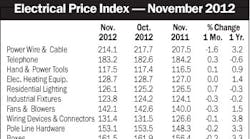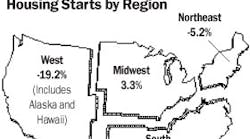Schneider Electric recently named Amy Huntington as its senior vice president of strategic global business development, managing a group that contributed more than $665 million in revenue in the first nine months of 2001.
Her new role, and the significance that Schneider has placed on the strategic global busineass development group, is indicative of the company's desire to create a more seamless international look to its organization. Schneider has coordinated its strategic global business development activities with large companies such as IBM, Ford, GM, Mercedes, Daimler Chrysler, Merck, Cargill and BP Amoco.
Huntington recently provided some insight into Schneider's global strategy:
What is the scope of this position?
The staff that works for me directly is in Paris, and we are managing the entire global strategic accounts program for Schneider Electric. The old team that I managed, the U.S. organization, is part of this vast network of entities around the world that link up to create this Schneider global business development initiative.
There are roughly 100 Schneider Electric global strategic accounts. Twenty-five percent of them are headquartered in the U.S. Each major country that sponsors a strategic account has similar organizations to the one in the U.S. I manage the interactions of all the strategic accounts teams. This includes developing the strategy for the customers and sub-segments that Schneider Electric will serve in the global program.
It's totally boundary-less. An international account manager's job is to develop and execute the strategy, leveraging Schneider's resources globally. Roughly 100 accounts within Schneider Electric are contributing more than 1 billion euro of business.
Is this position new to the company?
No, I'm replacing an individual who went to lead the international division. (Jean-Pascal Tricoire) was appointed to be the executive vice president for the international division.
Global business development is transforming Schneider. It's challenging when a customer is headquartered in the U.S., and they're going to build a factory in South America, and all the equipment for the factory floors are in Germany and Spain.
Have strategic global accounts always operated out of Palatine, Ill.?
The way our senior management team is structured, an executive committee with eight executive vice presidents reports to our chairman. Chris Richardson, president and chief executive officer of the North American division, is one of those executive committee members. Chris is accountable for the success of global business development. I report to Chris. I'm in Chicago, only because Chris Richardson is in Chicago. The staff that really helps to animate this global business development is in Paris. I spend a lot of time there. We've built a diverse team of 15 employees at the central staff to represent the diversity in the marketplace that Schneider serves. It's not an American initiative or a French initiative. It's a global initiative that allows U.S. to make the most of our cultural diversity within Schneider. The network of Schneider global business development (people), located in other countries, is in the hundreds.
Is it surprising that an American would head up this unit?
No. My predecessor was French and the person after me could really be from anywhere. It just so happens that my office is in Chicago, but I've spent probably one-and-a-half to two weeks a month out of the country. Our customers are investing everywhere.
Is this type of global organization a change for the company?
The U.S. strategic accounts focus goes back to 1994, when there were 12 accounts that were targeted. Today, there are between 100 and 120 that have been selected by Schneider.
You have to go a step beyond just telling someone you have accountability for IBM around the world. You have to arm them with the tools and ensure that the rest of the organization — globally — understands the program.
For example, each one of the global strategic accounts for Schneider Electric has an executive sponsor. They work with the account manager to be the champion within Schneider for that account.
Is a ‘strategic account’ essentially what another company would call a ‘national account?’
Any account that Schneider Electric has targeted on a global basis and made that significant commitment to, that's a global strategic account. That means we are providing absolute boundary-less coordination for that customer. We are investing in dedicated teams that are absolutely dedicated to a customer. The goal is to be able to coordinate and help the customer leverage these Schneider resources globally. We're able to get really intimate when we've made this sort of commitment to a customer.
Is the strategic global business accounts group going in any other new directions?
We want a customer to make one phone call and have the ability to work with an entity that can source equipment anywhere in Schneider to anywhere in the world, not just what might be available in the customer's local domain. Every salesperson in Schneider sells that entire portfolio today. It's great because it gives them a huge toolbox to take to a customer.
The new direction is that the demand for electricity is increasing and the investment in electricity in the next 20 years will eclipse the entire investment of the 20th century. It's an exciting field to be in now, because there's more and more demand for products that control, distribute and automate. For Schneider Electric that's pretty exciting.
We have customers who will be going to the underdeveloped nations of the world. That's where there's tremendous opportunity when you look at it on a global basis.
How do your service and distribution differ in various parts of the world?
The models are different everywhere. For customers that are investing in the United States or might be foreign-owned and operate in the United States, we work hard so that they understand the value of distribution and that the models between Europe and the U.S. are different. We say, ‘The model in the U.S. is different; distributors add value.’ We make absolutely sure the customer is educated in the role distribution plays in the United States. and the role they may or may not play in the rest of the world.

